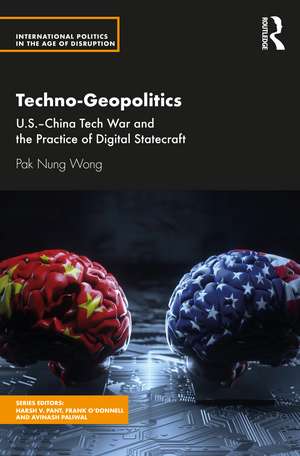Techno-Geopolitics: US-China Tech War and the Practice of Digital Statecraft: International Politics in the Age of Disruption
Autor Pak Nung Wongen Limba Engleză Paperback – 24 sep 2021
Analysing the ramifications of the ongoing U.S.–China trade standoff, this book maps the terrain of technological war and the race for global technological leadership and economic supremacy. It shows how China’s technological advancements not only have been the key to its national economic development but also have been the core focus of U.S. intelligence. Further, it draws on U.S.–China counterintelligence cases sourced from the U.S. Department of Justice and Federal Bureau of Investigation (FBI) to explore emerging patterns and techniques of China’s espionage practice.
A cutting-edge study on the future of statecraft, this volume will be of great interest to scholars and researchers of international relations, security and intelligence studies, information technology and artificial intelligence and political science, especially U.S. foreign policy and China studies. It will also be of great interest to policymakers, career bureaucrats, security and intelligence practitioners, technology regulators, and professionals working with think tanks and embassies.
| Toate formatele și edițiile | Preț | Express |
|---|---|---|
| Paperback (1) | 347.84 lei 6-8 săpt. | |
| Taylor & Francis – 24 sep 2021 | 347.84 lei 6-8 săpt. | |
| Hardback (1) | 995.37 lei 6-8 săpt. | |
| Taylor & Francis – 24 sep 2021 | 995.37 lei 6-8 săpt. |
Preț: 347.84 lei
Nou
Puncte Express: 522
Preț estimativ în valută:
66.56€ • 69.74$ • 55.02£
66.56€ • 69.74$ • 55.02£
Carte tipărită la comandă
Livrare economică 11-25 aprilie
Preluare comenzi: 021 569.72.76
Specificații
ISBN-13: 9780367497149
ISBN-10: 036749714X
Pagini: 134
Ilustrații: 10
Dimensiuni: 152 x 229 x 7 mm
Greutate: 0.25 kg
Ediția:1
Editura: Taylor & Francis
Colecția Routledge India
Seria International Politics in the Age of Disruption
Locul publicării:Oxford, United Kingdom
ISBN-10: 036749714X
Pagini: 134
Ilustrații: 10
Dimensiuni: 152 x 229 x 7 mm
Greutate: 0.25 kg
Ediția:1
Editura: Taylor & Francis
Colecția Routledge India
Seria International Politics in the Age of Disruption
Locul publicării:Oxford, United Kingdom
Public țintă
PostgraduateCuprins
1. Introduction: Beneath the U.S.-China Trade War 2. Techno-Geopolitics: Toward Novel Theoretical Framework Transcending the ‘Techno-Nationalism Vs. Techno-Globalism’ Dualism 3. Re-charting the Rimland: U.S.-China 5G Techno-Geopolitical Containment and Counter-containment in Asia and Europe 4. Rise of China’s Intelligence Capability: Intelligence Culture, Panoptic State-Building and Tradecraft Techniques 5. Conclusion: Outline of the Practice of Digital Statecraft
Notă biografică
Pak Nung Wong teaches politics and international relations at the University of Bath, U.K. His recent publications include Destined Statecraft: Eurasian Small Power Politics and Strategic Cultures in Geopolitical Shifts (2018), Discerning the Powers in Post-Colonial Africa and Asia: A Treatise of Christian Statecraft (2016), Post-Colonial Statecraft in South East Asia: Sovereignty, State-Building and the Chinese in the Philippines (2013). He is Editor-in-Chief of Bandung: Journal of the Global South, which he founded with an international network of scholars, practitioners and policymakers in 2013. Apart from publishing in the English language, Dr Wong’s Chinese-language columns in Hong Kong-based media have been followed, translated and used by governmental ministries in foreign affairs, defence, security and intelligence services, culture and religion, technology and higher education across the world.
Descriere
Techno-Geopolitics explores contemporary US-China relations and the future of global cyber-security through the prisms of geopolitics and financial-technological competition.


